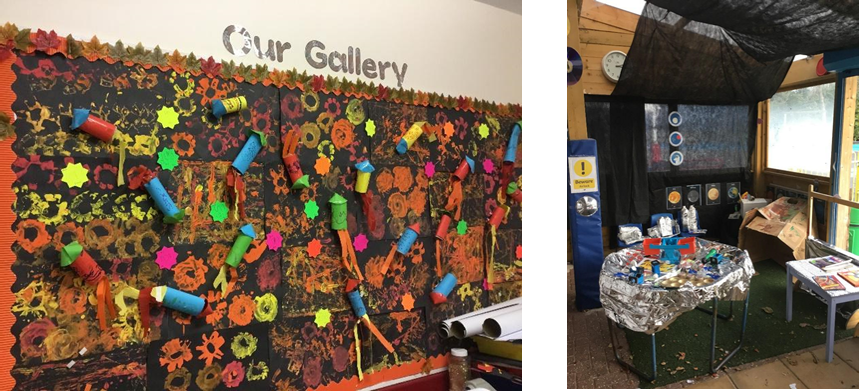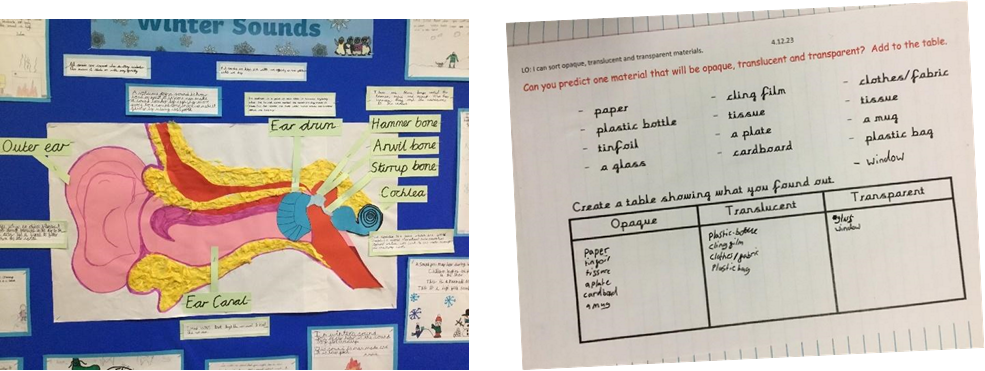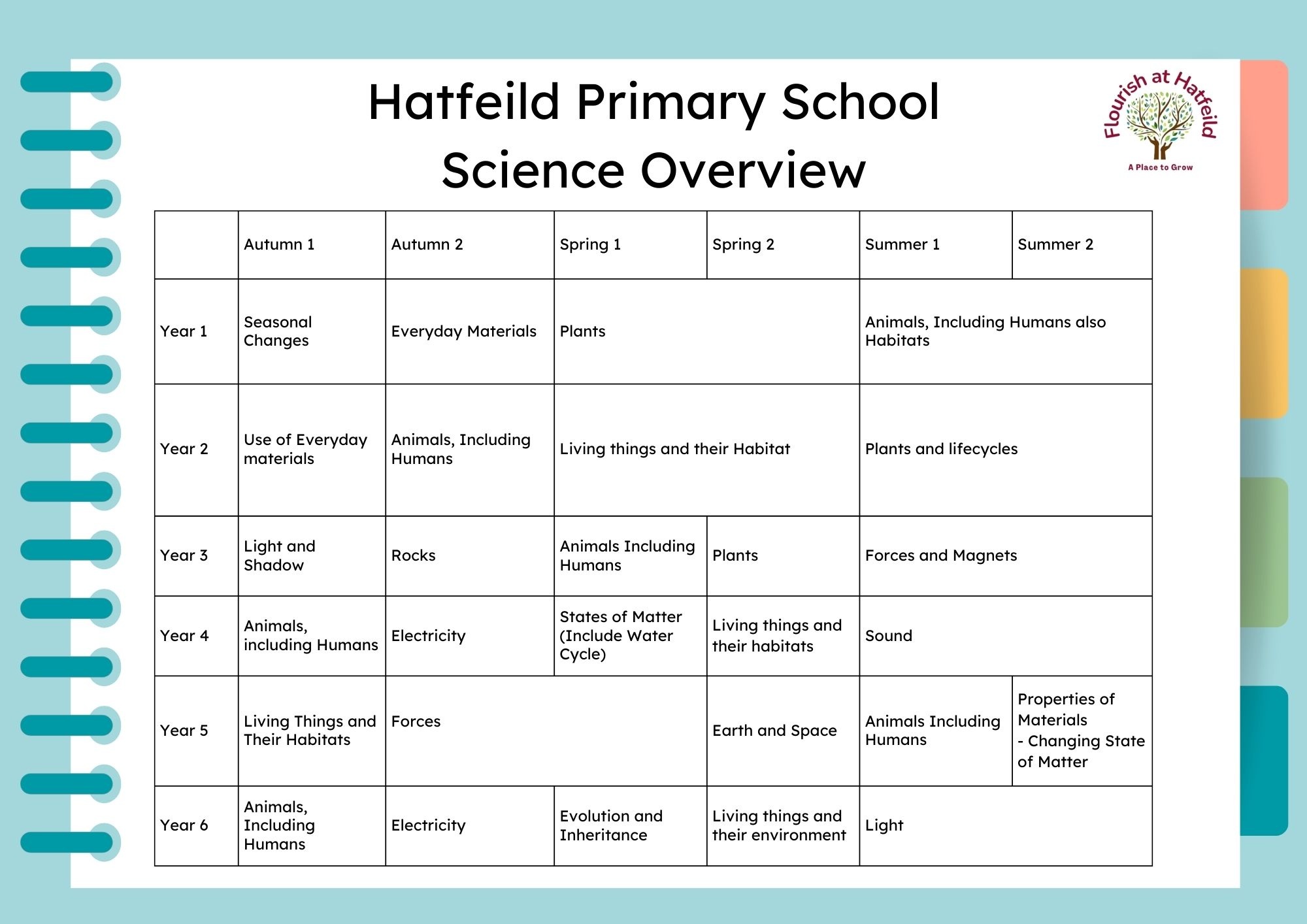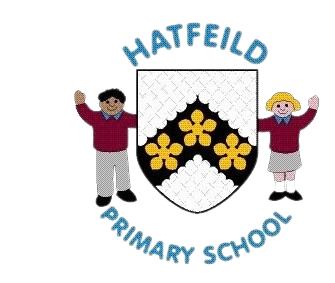Science
Intent
At Hatfeild Primary School it is our intention that every pupil develops such a passion for Science that they harness their natural excitement and curiosity and, in turn, this encourages them to pursue scientific enquiry. We know that every child is excited by scientific ideas and wants to learn to explain and analyse phenomena, make predictions and solve problems. We encourage children to be inquisitive throughout their time at school and beyond. The Science curriculum fosters a healthy curiosity in children about our universe and promotes respect for the living and non-living. We believe science encompasses the acquisition of knowledge, concepts, skills and positive attitudes. Throughout the programmes of study, the children will acquire and develop the key knowledge that has been identified within each unit and across each year group, as well as the application of scientific skills. We ensure that the working scientifically skills are built-on and developed throughout children’s time at school, so that they can apply their knowledge of science when using equipment, conducting experiments, building arguments and explaining concepts confidently and continue to ask questions and be curious about their surroundings.
We aim to address all needs, and we deliver the Science curriculum to all pupils, including SEND and EAL, through a broad and balanced approach. Where possible, children will be supported with word banks and additional writing frames to support their learning. We encourage a range of ways for children to record their verbal responses (diagrams, photographs etc). Children have weekly lessons in Science throughout Key Stage 1 and 2, using various programmes of study and resources. In Early Years, Science is taught through children learning about the world around them in their learning through play. We ensure that all children have engaging opportunities within Science, to enable them to achieve their full potential. Where possible, we encourage outdoor learning and link school trips to our Science topics covered in school. An example of this was our Year 6 residential trip to Stubbington.
We endeavour to ensure that the Science curriculum we provide will give children the confidence and motivation to continue to further develop their skills into the next stage of their education and life experiences.

Implementation
Our skills-based progression allows teachers to be clear of end goals, build on what has been taught previously and ensure complete coverage of the curriculum. Working scientifically is integrally taught within all lessons. Where possible, links are made with other subjects to enrich learning. There are opportunities each term for children to develop their investigative skills, focusing on different aspects of enquiry. We will incorporate the use of technology where appropriate. Lessons are to be practically led as much as possible. Teachers use Teaching Assistants to help support children when needed. Pre-teaching of scientific vocabulary at the start of each topic is encouraged, so it can be used in the following lessons. Children are provided with a range of engaging resources to enable the children to carry out fun and exciting experiments to deepen their learning and develop their understanding of the concept that is being taught. We ensure that there are opportunities for paired, group and class discussion/debate to consolidate learning. Teachers plan by building on areas previously taught in other year groups that show progression. Pupils will be engaged through the use of a range of resources and the use of media to carry out practical sessions. Teachers support, encourage, foster and nurture a love of science.
Children are supported in a range of ways: Extra time may be given for learning vocabulary for EAL and SEND pupils in order for them to join in discussions. Adaptations are made so that all children can meet the Learning Objectives. Experiment resources will be checked to ensure they are safe and can be used with the children. Children are challenged in a variety of ways: work may be adapted to give certain children a further challenge. Questions can be asked to children to further their individual knowledge and work on the extra information they may know. Children are allocated roles during team activities and experiments so that they are able to observe, discuss and evaluate their findings. We ensure that all children can access the curriculum through providing children who have SEND or EAL needs with access to Science vocabulary word banks prior to/at the start of the topic. Grouping children so that they are able to support one another. Providing visual/practical prompts. Teaching lessons using a range of different techniques to appeal to different learning styles, e.g. videos, drama, texts etc.

Impact
● Children enjoy themselves and are enthusiastic about science.
● Children are confident to use and explain scientific vocabulary.
● Children can ask questions about their science learning and reflect on their knowledge.
● There is a clear progression of children’s work and teachers’ expectations.
● Children are becoming increasingly independent in Science, and completing pupil-led investigations.
● Children complete pre-assessments (KWL) to ensure any misconceptions about a topic are addressed.
● Children complete post-assessment questions to assess children’s learning.
Pupils’ Voice
“I loved learning about space. I want to go to the moon now!” - Reception.
“I love finding new things when I investigate” - Year 2.
“I’ve learnt lots of new words. I can tell you what a cochlea is!”- Year 4.
“I have enjoyed the fun and exciting investigations. If you have a question, then an investigation will help you find the answers and explain to others.” - Year 6.


